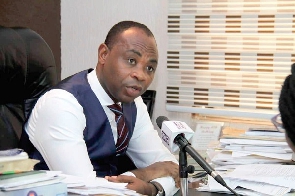 Bright Appiah, Executive Director of Child Rights International
Bright Appiah, Executive Director of Child Rights International
Over the years, politicians have been involving children in electioneering. The general public probably has not thought of how such involvement could harm the particular children being used and even their parents.
The truth is that for their nature, children bring joy to the hearts of others by the harmless things they do. In the 2000 electioneering, for instance, some children sang a song to support the campaign of then candidate John Agyekum Kufuor. That song was so serenading that some parents wished their children were involved in its rendition.
However, the Executive Director of Child Rights International (CRI), Mr Bright Appiah, has called attention to the harm the children involved in such campaign and even their parents can suffer.
Providing reasons for the CRI call, he gave the impression that children did not have a full understanding of certain issues raised in campaign messages to be able to act with better appreciation of them.
To support the afore-mentioned reason, Mr Appiah said the children were coerced or staged for adverts for political purpose even though politician “are fully aware that in our electoral design, children do not have the right to vote. Therefore, they are not needed in the process.
“We have seen this on television and campaign platforms where children were made to come and attest to how good or bad a certain policy from a political party is. This is not right at all.”
Who is a child? The Ghanaian Times would like to ask so parents in particular can be guided. The UN Convention on the Rights of the Child defines a child as “a human who is below the age of 18 years.”
Ghanaian children have rights under the 1992 Constitution and the children’s Act 1998, Act560. One of the rights is child protection, which seeks to guarantee the right of all children to a life free from violence, abuse, exploitation, and any form of harm such as being at the vagaries of the weather.
Based on the content of the child protection principle, we can say that political parties have erred in the case of exploitation, but the question is, are those crafting the campaign message aware of that?
In the Ghanaian cultural setting, children are not so much regarded as important and are exploited in most situations. The CRI is right that some parents push their children into political campaigning.
The truth is that because some parents push their children into the space where they are exploited, those who come in to exploit have it easy to do so.
There are other issues of child welfare which must be brought into focus in these times when other countries have realised the need to prepare their children towards responsible and productive adult lives.
For instance, we should make sure children have decent accommodation, healthcare, education, at least up to the secondary level; are free from hunger, abuse of any form; and encouraged to be aware of and understand their rights.
The Ghanaians Times thinks when this happens, they too can rise against their exploitation.